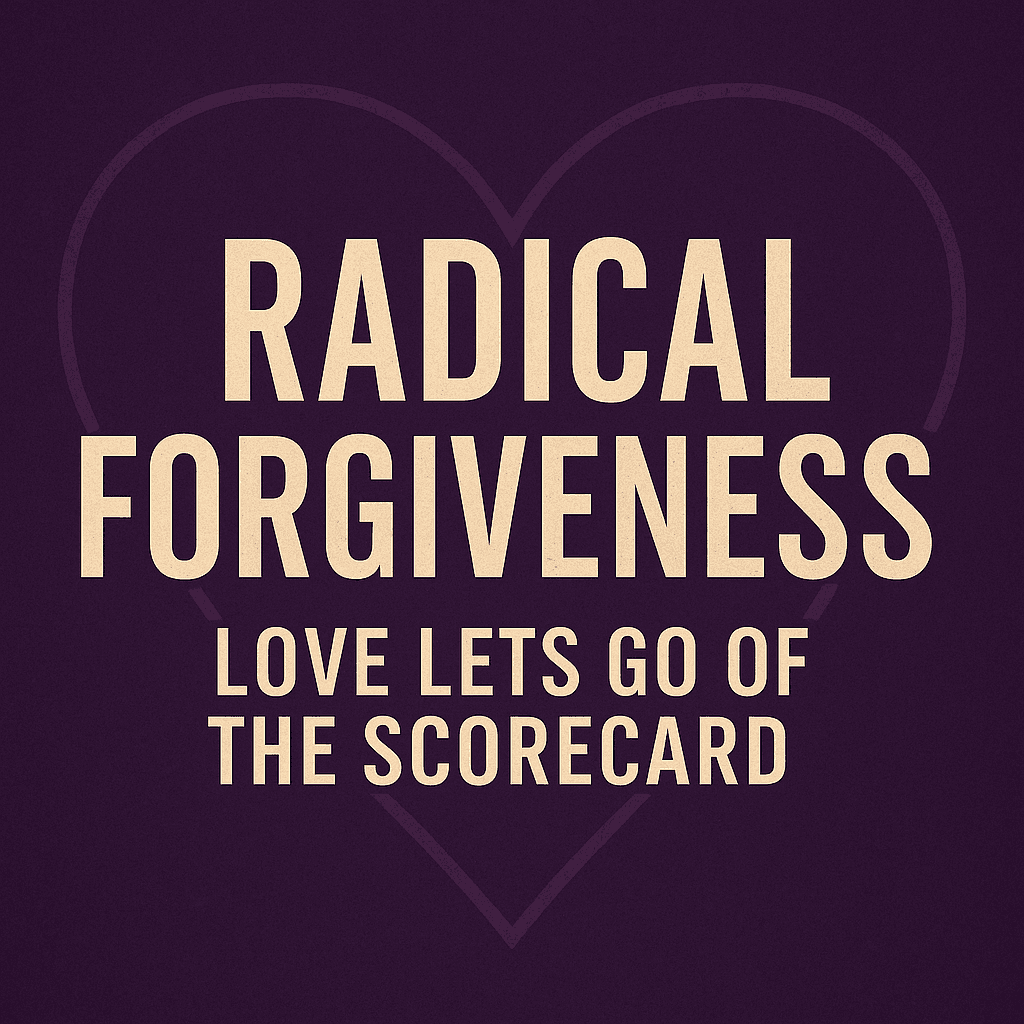
Door 3: Radical Forgiveness – Love Lets Go of the Scorecard
July 9, 2025
Some people can quote 1 Corinthians 13 like a script, but carry offense like a spreadsheet. If we are honest, we have all been tempted to run the numbers. Who said what. Who apologized. Who didn’t. Who showed up for us. Who disappeared when it mattered.
But here’s the problem. Agape love doesn’t run tabs. It tears up the receipt.
Forgiveness in the Kingdom is not sentimental. It is not passive. It is not even optional. It is radical. And that kind of forgiveness is not possible apart from the mercy of God working inside us. This door is not opened by emotional closure. It is opened by a key called mercy.
The Scorecard Feels Justified, But It’s a Trap
In our flesh, keeping score gives us a sense of control. If I can track the offense, I can feel justified in my distance. I can spiritualize my silence. I can use boundaries as walls instead of bridges.
But Jesus never said, “Forgive when you feel safe enough.” He didn’t say, “Forgive once they understand what they did.” He said, “Forgive, just as I forgave you.”
Let that sink in. Not in the way you understand forgiveness, but in the way He defined it — while hanging on a cross, bleeding out for people who were not sorry and were not changing. That is agape. That is radical. That is divine.
Scripture Does Not Flinch
Colossians 3:13 (NASB)
“…just as the Lord forgave you, so must you do also.”
It is not a suggestion. It is not framed as a process. The apostolic imperative is clear — if you have received mercy, you are now required to release it.
Unforgiveness is the silent poison that keeps believers emotionally stagnant and spiritually stunted. It breaks fellowship, grieves the Spirit, and clogs the flow of agape in a community.
Forgiveness Is Not a Feeling
Forgiveness is a decision to release someone from your internal courtroom. It is the refusal to be judge, jury, and executioner. You may still feel pain. You may still be healing. But the difference is that you are no longer holding someone hostage while calling it wisdom. It is impossible, outside of the grace that makes the impossible…possible.
You can forgive and still pursue healthy boundaries. You can forgive and still acknowledge injustice. But when mercy is your foundation, you no longer require payback in order to walk in peace.
Forgiveness doesn’t say, “What you did was okay.” It says, “I’m not going to carry it anymore, it just isn’t worth it.”
Mercy Severs the Scorecard
Mercy removes the transaction and initiates the restoration. It lets go of what is owed. It ends the emotional contract. And it starts the healing process.
Without mercy, forgiveness feels impossible. But with mercy, we begin to see the offender the way Christ saw us — worth saving. Worth loving. Worth forgiving before we even asked.
Love Does Not Keep a Record of Wrongs
1 Corinthians 13:5 tells us clearly, love “does not take into account a wrong suffered.” The language here is financial. Love does not itemize injury. It does not write a ledger of offense. It does not highlight the wounds in bold font every time the person walks into the room.
Mature love loses track of the debt on purpose. Not because it forgot, but because it decided to stop collecting.
What This Door Reveals About Us
Radical forgiveness reveals whether we are still living out of mercy or trying to manage our pain through performance and control. It exposes our maturity, or lack thereof. And it brings us face to face with the most powerful question in the room:
“Will I give to others what Christ keeps giving to me?”
What This Door Demands of a Fellowship
In a true apostolic community, forgiveness is not just a private act. It is a public culture. The more mercy we receive, the more naturally we release it. When we walk through this door together, we stop looking for reasons to separate and start looking for ways to reconcile.
Forgiveness does not mean you were never hurt. It means you value fellowship more than you value being right. And that is a kind of power the world cannot imitate.
Final Thought
You do not get to choose who needs forgiveness. But you do get to choose who you become in the process.
If mercy is the key, then forgiveness is the door that releases you as much as it releases them.
So drop the scorecard. Tear up the invoice. Cancel the emotional debt.
Because love keeps no record. And you were never called to live like a bookkeeper.
Support This Ministry
If this content has blessed you, consider partnering with us to reach more lives with the Gospel.
Partner with Us